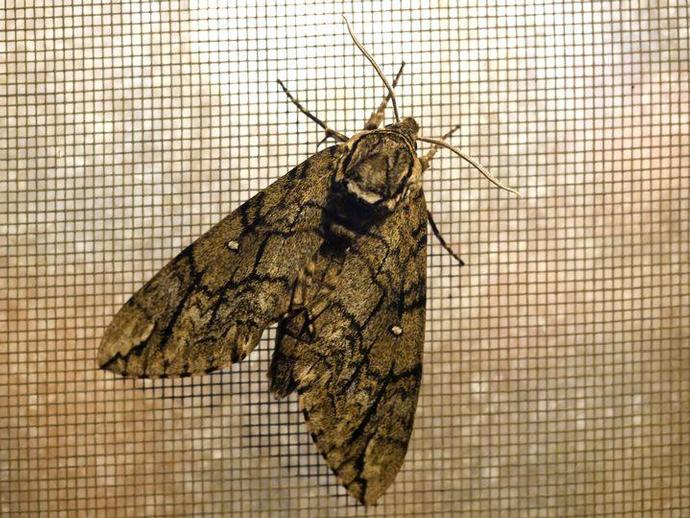September 18, 2021
We're reaching into the archives for today's #BenInNature update presented by our friends at Carter Bank & Trust! The following post was originally published on August 6, 2020.
If you've been following these nature posts, you've probably noticed that I like to post cool moths. There are two in particular I'm still hoping to spot: the Luna moth (Actias luna), which seems to be everyone's favorite, and the cecropia moth (Hyalophora cecropia), which is the largest moth native to North America.
While I haven't spotted those two yet, it seems like just about every other large moth in Virginia has paid a visit to my back porch, including today's critter: Ceratomia undulosa, the waved sphinx. While this may not be the most striking moth around, it is pretty big, as you can see in the comparison photo with my orangutan-esque hand.
Caterpillars of the waved sphinx primarily feed on the leaves of ash trees, while the adults probably don't feed at all. You can find the larvae and the adults in a variety of habitats east of the Rocky Mountains, including deciduous forests and even suburban neighborhoods. The adults are strictly nocturnal and are drawn to lights.
These moths are fairly common and they have two generations per year in the south, so keep an eye peeled when you're around your porch light; there's a good chance one might pay you a visit!
ABOUT #BenInNature
Social distancing can be difficult, but it presents a great opportunity to become reacquainted with nature. In this series of posts, Administrator of Science Ben Williams ventures outdoors to record a snapshot of the unique sights that can be found in the natural world. New updates are posted Monday - Friday, with previous posts highlighted on the weekends. This series of posts is made possible thanks to the support of VMNH Corporate Partner Carter Bank & Trust (www.cbtcares.com).
NATURE PHOTO IDENTIFICATIONS
If you discover something in nature that you would like help identifying, be sure to message us right here on Facebook with a picture (please include location and date of picture) and we'll have our experts help you identify it!

 Hours & Admissions
Hours & Admissions Directions
Directions

